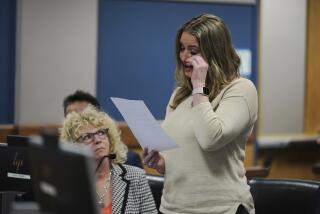Misuse of Powers Calls for Change
- Share via
The allegations in the Whitewater investigation against presidential aide Bruce Lindsey brought into sharp focus how far independent counsel Kenneth Starr has strayed from appropriate limits on his duty and discretion. The effect of Starr’s performance has been to make clear the need to reform the independent counsel statute.
What is troubling about this case is why Starr insisted on putting Lindsey through this ordeal in the first place. For almost two years, Starr used his office to attribute to Lindsey improprieties that were never even adequately defined, let alone proved. On Aug. 1, the jury in the trial of two Arkansas bankers, though hopelessly deadlocked on other counts, voted unanimously for acquittal on the four counts with any connection to Lindsey.
The allegations involved President Clinton’s 1990 campaign for Arkansas governor. The independent counsel investigated whether Lindsey, the campaign’s treasurer, had conspired with a bank to ignore an Internal Revenue Service reporting requirement. What has been clear from the beginning is that Lindsey had no motive to skirt the IRS when he was making cash withdrawals for legally valid purposes. The very same information that should have been reported to the IRS was required to be reported publicly under another statute, and Lindsey did report it.
These facts were known by the independent counsel team since it began.
The IRS statute was designed to detect money laundering and tax evasion, not to duplicate an existing political reporting statute. Prosecutors normally use the IRS statute to trip up gangsters, drug dealers and the Mafia, not to ensnare friends of the president.
Even after it became clear that there was no case against Lindsey, Starr proceeded to implicate him anyway, naming him as an “unindicted co-conspirator.” Because an unindicted co-conspirator does not face charges in court, he does not have the opportunity to defend his actions or his name. Nevertheless, Lindsey was marked with a label that carries heavy symbolism, especially in Washington, for his reputation and politically for the president. Starr and Deputy Prosecutor W. Hickman Ewing Jr.--who dealt harshly with Lindsey on the witness stand and disparaged his credibility to the jury--must have foreseen the newspaper headlines their actions would generate. They nevertheless maintained that theirs was an important and legitimate case.
Once the acquittals were announced, however, Ewing took pains to diminish Lindsey’s importance to the case and the importance of the acquittal verdicts to the overall investigation. If the importance of the counts implicating Lindsey was so slight, why was the prosecution of those counts and the smearing of his name undertaken in the first place? It is hard to find any nonpolitical reason. It is difficult not to believe that Lindsey’s real wrongdoing, in Starr’s eyes, was that he was a friend and close advisor to President Clinton.
The apparent prosecutorial model being used by the independent counsel is to produce witnesses for the prosecution--often by pressure tactics or by charging them with allegations peripheral to what the investigation is supposed to be about--who can be connected to the president in some way. As a result, actions that had little to do with the investigation have instead been the focus of intense and well-funded prosecutorial effort, as well as glaring public scrutiny.
In the end, the trial took months to prepare and conduct, but afforded Starr no progress toward putting to rest the major issues he was charged with investigating. The victims here are not merely Lindsey and his family, but the public’s confidence in a politically neutral and fair independent counsel.
This case causes me even greater concern for another reason. During my tenure as White House counsel, I was inspired by Lindsey’s quiet display of grace under pressure while being so vigorously pursued by Starr. Though living in the cross-hairs of a prosecutorial cannon, Lindsey was unfailingly gracious and even-tempered. He also proved himself to be an outstanding lawyer and deputy. Those who know him did not need the Arkansas jury verdict to vindicate his good name.
Congress needs to reform the independent counsel statute, which now creates a virtually unchecked prosecutorial power that is too easily abused. Reps. Jay Dickey (R-Ark.) and Henry J. Hyde (R-Ill.) have advocated useful reforms. If we can remedy this overused, overpoliticized procedure, then Lindsey’s ordeal will have had some benefit for all.
More to Read
Get the L.A. Times Politics newsletter
Deeply reported insights into legislation, politics and policy from Sacramento, Washington and beyond. In your inbox twice per week.
You may occasionally receive promotional content from the Los Angeles Times.










